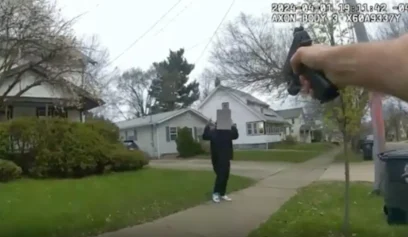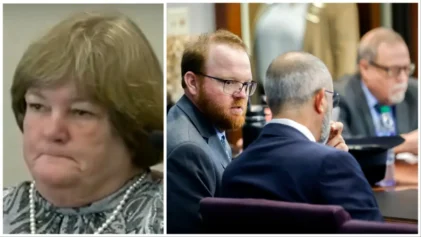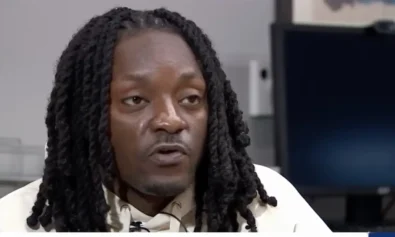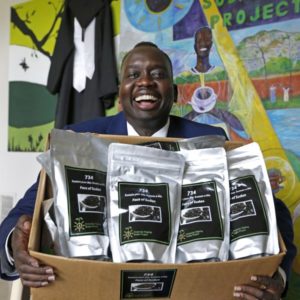
Manyang Kher launched 734 Coffee as a way to help fund education initiatives for Sudanese refugees. (Image courtesy of Akandu Nwoso)
Infighting. Ethnic cleansing. Civil war. Famine.
More than 1.6 million men, women and children have been driven from South Sudan, making it the fastest-growing refugee crisis in the world, the United Nations High Commissioner for Refugees announced earlier this year. Now a Washington–based coffee company is looking to lend a helping hand to those displaced by the unrest.
Founded in 2016, 734 Coffee launched with a mission to make “great coffee for the greater good” while helping to build brighter futures for the millions of displaced residents of South Sudan. Founder and executive director Manyang Kher, a former “Lost Boy” of Sudan, began the company as a way to help refugees help themselves and become more sustainable.
The Gambela region of Ethiopia is now home to over 200,000 displaced South Sudanese citizens, along with the coffee company’s growing and harvesting sites. After being imported to the United States, 80 percent of all profits from coffee sales go right back to scholarships and educational programs for South Sudanese refugees.
“What does that mean in terms of impact? It means that every bag of coffee you purchase is one more day of school for 4 refugees,” the company’s website reads. “Every cup you brew means one more hour of learning — one more hour to change a life. With 734 Coffee every morning, you’re not just starting your day, you are starting a whole new future for a soul in need.”
But the good vibes don’t end there.
734 Coffee is ethically sourced from a co-op of African-owned and operated farms, imported as fair-trade to support sustainable work for African farmers and, lastly, is roasted by local independent coffee roasters here in the United States, according to the company’s website. The brew has also been graded Specialty, or “Grade A,” by the Specialty Coffee Association of America.
Seeing as coffee originated in Ethiopia, selling the brewing beans as a way to give back just made sense, marketing manager Akanadu Nwoso told Atlanta Black Star. In fact, the coffee company’s name references the geographical coordinates for the country’s Gambela region: 7˚N 34˚E.
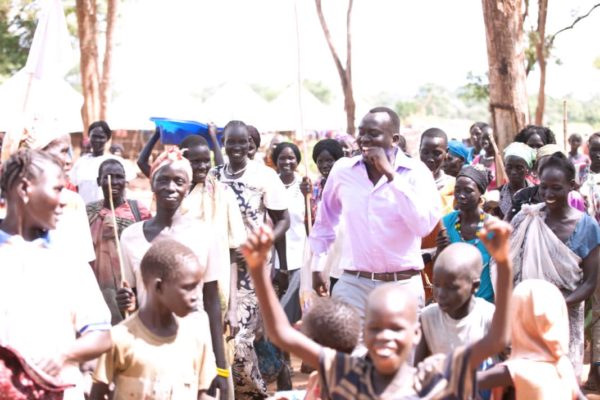
Founder Manyang Kher (center) launched Humanity Helping Sudan and 734 Coffee in an effort to help South Sudanese refugees become sustainable and self-sufficient through education. (Image courtesy of Akandu Nwoso)
We asked ourselves “how can we do more?” Nwoso said. “We realized that maybe a better investment would be investing into the people … thereby, we just wanted to become more sustainable as an organization.”
Nwoso added that 734 Coffee also seeks to accomplish three things: raise awareness about the refugee crisis; promote economic vitality in the Gambela region by providing money to local farmers, thus incentivizing them to hire refugees; and, most important, provide funds to support educational initiatives. Through its profits, the recently started coffee company has been able to sponsor four students’ educations so far. Nwoso says this is just the beginning, however.
“We just don’t want to educate and leave,” he explained. “We want to provide a platform and … grow with them. So if one of the scholars comes back and says, ‘I have an idea,’ … we can be a source for advice, a source for funding, and a source for direction.”
The coffee company is part of a larger initiative also launched by Kher called the Humanity Helping Sudan Project.The unique project currently offers on-the-ground programs across the Gambela region, providing agricultural aid, community gardens and education programs to nearly 40,000 displaced citizens. Like them, Kher spent 13 years in a refugee camp after becoming one of the thousands of “lost boys” left orphaned by the nation’s civil war at just 3 years old. He finally got the chance to immigrate to the United States when he turned 17, after which he threw himself into his studies and started the project to help those who were not as fortunate to have escaped the camps.
Nwoso described his friend as “passionate” and someone who doesn’t forget people, especially those still struggling back home.
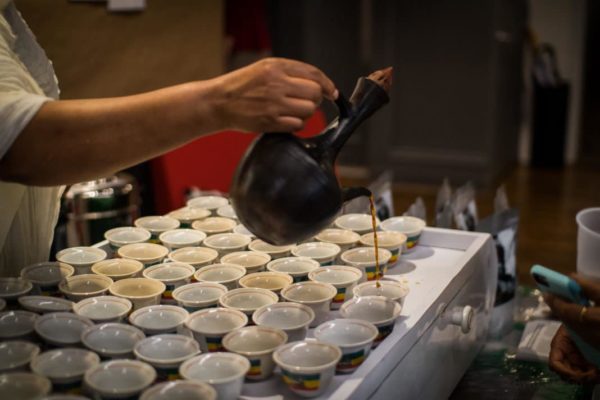
Ethiopian coffee is known for its full-bodied flavor and chocolatey, floral notes. (Image courtesy of Akandu Nwoso.)
With coffee in mind, the HHS project is now working to expand its efforts across the nation. Nwoso said 734 Coffee is currently in talks with Whole Foods Market and has plans to get into other health food stores. Forming key partnerships with grocers who want to help the cause is also key, he added.
Citing a lack of diversity in the coffee industry as part of the reason behind its ambitious expansion efforts, the marketing manager said the company wants to move as fast as it can while keeping its purpose in mind. He noted that while the majority of the world’s coffee comes from predominately Black nations like Ethiopia and Brazil, there are very few people of color in positions of power within the industry.
Phyllis Johnson, co-founder and CEO of coffee company BD Imports, knows this first hand. Speaking to Sprudge.com earlier this year, Johnson said race is an issue that affects coffee across both the supply and demand chains.
“Coffee’s been and unfortunately in some ways still is a vehicle for racism and unbalanced and inequitable relationships throughout the supply chain,” she told the coffee culture website. “We can’t glamorize altitude, varietals, and all the new inventions without addressing the history and its present effects of this product. To look at the heaviness of [racism] and try to untangle some of it, that’s where the real work and the real value is.”
Johnson also highlighted the lack of diversity in the ownership of local cafes, adding that gentrification also doesn’t help bring more Black and Brown faces into coffee houses.
Nwoso echoed these same sentiments, stressing the need to help diversify the industry. For him, it was the election of Barack Obama as the first Black president of the U.S. that made him realize how far a nonwhite person could make it in America and the world.
“When you see more people [of color] in different industries, you know that the next generation is going to be inspired … [they’ll think] ‘If they can do it, then I have that possibility too,’ ” he said.
Going forward, the 734 Coffee company says it has plans to expand in the near future. The unique beans, known for their chocolatey, floral flavors, are currently sold online and in the Washington and Richmond areas.
The company’s ultimate goal? To give back and empower the refugees of South Sudan.
“At the end of the day, a community is dependent on us succeeding,” Nwoso said. “We just want to make sure we can fulfill our mission of helping refugees become sustainable.”
